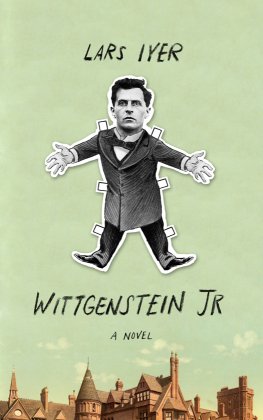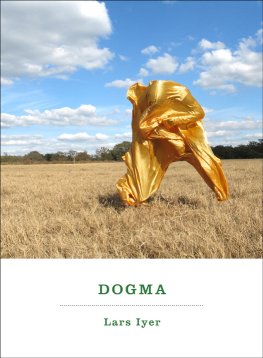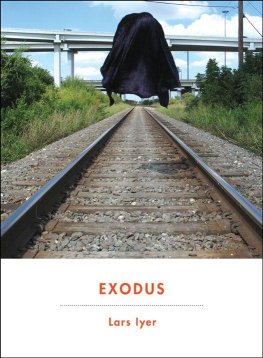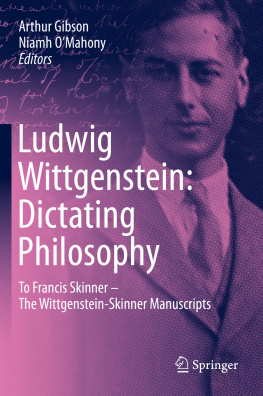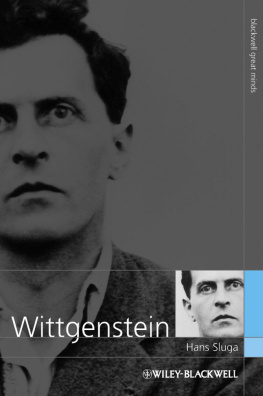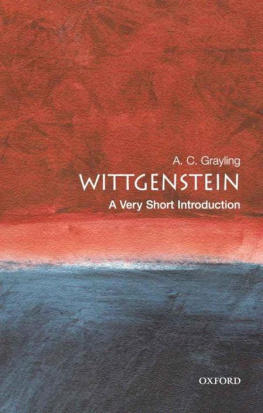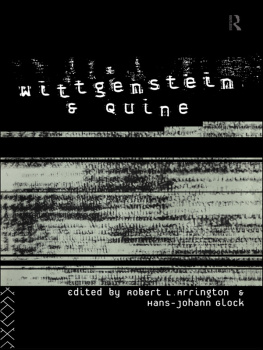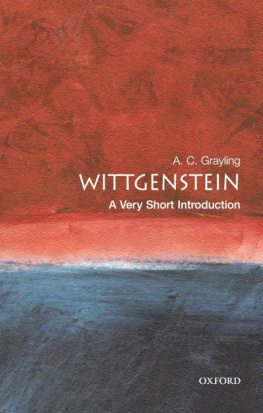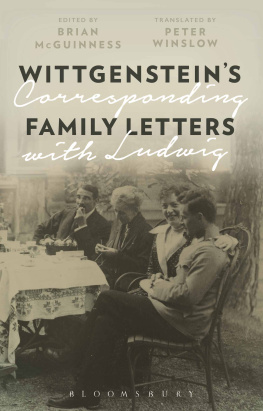When you are philosophising you have to descend into primeval chaos and feel at home there.
Wittgenstein
Wittgensteins been teaching us for two weeks now.
Was it Edes idea to call him Wittgenstein? Or Doyles?
He doesnt look like Wittgenstein, its true. Hes tall, whereas the real Wittgenstein was small. Hes podgy, whereas the real Wittgenstein was thin. And if hes foreign European in some sense he has barely the trace of an accent.
But he has a Wittgensteinian aura, we agree. He is Wittgensteinisch, in some way.
He has clearly modelled himself on the real Wittgenstein, Doyle says (and Doyle knows about these things). He dresses like Wittgenstein, for one thing the jacket, the open-necked shirt, the watch strap protruding from his pocket. And he behaves a bit like Wittgenstein too: his intensity his lips are thinner than any weve seen; his impatience the way he glared at Scroggins for coming in late; his visible despair.
And of course, like the real Wittgenstein, he has come to Cambridge to do fundamental work in philosophical logic.
He sits on a wooden chair at the top of the room, bent forwards, elbows on his knees. His gaze is directed downwards. His eyebrows are raised, and his forehead is furrowed. He has the appearance of a man in prayer (Doyle). Of a constipated man (Mulberry).
He doesnt prepare his teaching. He doesnt lecture from notes. At most, he produces a scrap of paper from his pocket and reads out a phrase, or a sentence. He wants simply to think aloud about certain problems, he says.
Sometimes he writes a word or two on the blackboard on the mantelshelf. In the first week: Denken ist schwer (thought is hard). In the second: Everything is what it is, and not another thing. Today: I will teach you differences.
None of us understands the problems he is wrestling with, we agree. None of us can follow his methodwhat is he looking for?
Not all of us care, of course. Mulberry is drawing cocks in his notebook. Guthrie wears sunglasses over closed eyes. Benwell groans audibly when Wittgenstein asks him a question.
When will he actually say something? When will he present an actual argument? Mulberrys taking bets.
He proceeds from reflecting on one question to another. From one remark to another. But when will he answer his questions? And what do his remarks mean?
A hand in the air.
DOYLE (humbly): Im having trouble following the argument.
WITTGENSTEIN: Thats because Im not presenting an argument. I am posing questions, thats all.
DOYLE: I dont understand. I cant follow your class.
WITTGENSTEIN: I have no intention of making myself understood.
DOYLE (imploringly): I have no idea whats going on.
WITTGENSTEIN: That is to the good. At this stage, you should have no idea whats going on.
Silence in class.
DOYLE: Perhaps we arent bright enough to follow you.
WITTGENSTEIN: Intelligence is nothing youre all clever. It is pride that is your obstacle. It is pride that is your enemy as students of philosophy. For pride leads you to believe that you are something you are not.
Wittgenstein surveys the room, looking carefully at us. He can see we know ourselves to be clever, he says. He can tell we believe ourselves to be full of Cambridge cleverness. But that means were also exposed to the danger of Cambridge pride.
We must not think we can hide, he says, scrutinising our faces. The inner life reveals itself in the outer life. It cannot help but do so. The secrets of the inner life are written on the face, he says. They reveal themselves in the simplest gesture. The way you sit on your chair The way you button or unbutton your jacket
We must learn to read the face, he says, just as much as we learn to read the page. We must learn to read the gesture.
The number of students is falling: forty-five in the first week, twenty-three in the second, eighteen in the third, and this week only twelve. Twelve! An auspicious number, Wittgenstein says. Hes glad to be rid of the hangers-on.
Twelve faces, to give him the sense that he is not alone. That there are others who might follow the movement of his thinking. He is glad there are others who need to be brought along with him, who might accompany him.
Were thinking with him: Dont we understand?
Naturally, he is suspicious of impatience, he says. But he is wary, also, of patienceone mustnt wait too long in ones studies.
Of course, he dislikes the stab-in-the-dark answer, he says. But he also dislikes the ready answer all answers must have something wild about them.
Beware clarity! he says. Beware the well-trodden path! But beware obscurity, too! Beware the never-trodden path!
Avoid explanation, he says. But also avoid obfuscation. Suspect conclusions. But suspect inconclusiveness, too.
The Backs, along the Cam. The colleges in a row across the river. Ivied walls and trim lawns sloping down to the water. Gloomy clouds, very low.
Twelve students and their teacher walking to wash off their brains. Wittgenstein, hurrying along, his hands behind his back. Okulu, a few paces behind, his hands behind his back. Chakrabarti, a few paces to the left of Okulu, his hands behind his back. Whippet-like Doyle, his hands behind his back. The Kirwin twins, their hands behind their backs. Benwell, scowling, close to the rivers edge. Guthrie, singing his hangover song. Mulberry, stripped to his FUCK YOU T-shirt, texting on his phone. Ede, sauntering, looking refined. Scroggins, looking spaced out.
Wittgenstein says nothing. The rest of us report on our summer. Titmuss did India, learning the Om Namah Shivaya chant and smoking bhang sadhu-style in the Himalayas. The Kirwins did the Iron Man in Mooloolaba and Lanzarote, and rowed on the Thames. Mulberry did strangers in the dark rooms of Madrid, and ran with the bulls in Pamplona. Doyle did the Edinburgh Fringe, Guthrie in tow, performing their show, Lil Leibniz.
Wittgenstein gestures to the university buildings across the river. None of this is real, he says. None of it.
Then, after a long pause: The world is emptying out. The sky is emptying out
Silence. We look at one another, confused.
Hes trying see Cambridge, Wittgenstein says. Hes done nothing else since he arrived. But all he sees is rubble.
The famous Wren Library! he says, and laughs. The famous Magdalene Bridge! Rubble, he says, all rubble!
We look around us immense courts, magnificent lawns, immemorial trees, towers, buttresses and castellated walls, heavy wooden gates barred with iron, tradition incarnate, continuity in stone, the greatest university in the world: all rubble? What does Wittgenstein see that we do not?
Wittgenstein is fervent today. He seems to blaze before us.
Written on the board in capital letters, and underlined three times: LOGIC.
We all know what logic is, he says. It is the study of the laws of thought. Of all the forms of reasoning and thinking. The trouble is, we do not know what logic means, he says. What reason means.
WITTGENSTEIN: If the laws of logic are not followed correctly, then reason is impossible. If reason is impossible, then what is said has no validity. If what is said has no validity, then what ought to be done remains undone. If what ought to be done remains undone, morals and art are corrupted. If morals and art are corrupted, justice goes astray. If justice goes astray, chaos and evil run amuck.
Were drowsy, some of us hungover. Audible sighs. Guthrie, snoring. Mulberry, wearing a

